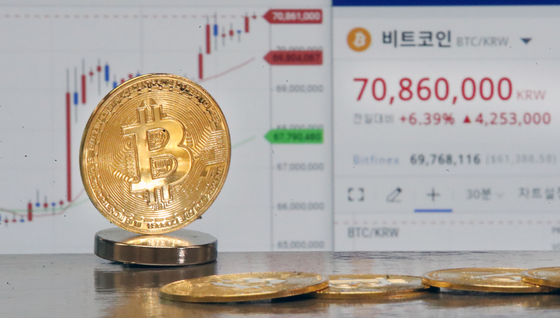Anti-money laundering obligations will be imposed on virtual currency exchanges such as Upbit and Bithumb from the 25th. A virtual currency exchange can operate only after meeting the requirements such as opening a real name account and reporting the business to the financial authorities.

On the morning of the 14th, the cryptocurrency bitcoin surpassed 70 million won each for the first time on a domestic exchange. News 1
The Financial Services Commission announced at a State Council meeting on the 16th that it has decided to amend the Enforcement Decree of the Act on Reporting and Use of Specific Financial Transaction Information (Special Act). The Enforcement Decree stipulates the obligation to prevent money laundering and registration requirements of virtual asset business operators in the Special Money Act, which takes effect from the 25th. Virtual asset business includes buying, selling, exchanging, or storing virtual assets. Virtual currency exchanges such as Upbit and Bithumb are representative virtual asset businesses.
Businesses who intend to do virtual asset business or existing business operators must report to the Financial Information Analysis Agency (FIU) by September. Failure to report will result in imprisonment of up to 5 years or a fine of up to 50 million won. Registration requirements such as obtaining information security management system certification (ISMS) from the Korea Internet & Security Agency, opening a real name confirmation deposit and withdrawal account (real name account), and meeting the qualification requirements for representatives and executives must be satisfied.
Virtual asset business operators must fulfill their obligations to prevent money laundering, such as customer verification, reporting suspicious transactions, and actions taken by virtual asset business operators from the 25th. However, as it is difficult for virtual asset business operators to fulfill their obligations to verify customers and report suspicious transactions before accepting a report, existing virtual asset business operators must fulfill their obligations to prevent money laundering after receiving the report. The handling of’Dark Coin’, a virtual asset with a high risk of money laundering, is also prohibited because it is difficult to understand the transaction details.
Therefore, there is also concern that small virtual asset exchanges may close down once the special money law is enforced. There are no official statistics from the financial authorities, but there are currently about 100 domestic virtual asset exchanges. Of these, only 12 places that have obtained ISMS certification, which are the reporting requirements, are Bithumb, Upbit, Coinone, and Kobit. There are fewer exchanges with real name bank accounts issued at four (Bitsum, Upbit, Coinone, and Kobit).
Banks are passive about issuing real-name accounts due to concerns over financial accidents and money laundering. Therefore, if there is no exchange of money with virtual assets, the Financial Services Commission decided to consider the reporting requirements to be satisfied even if a real-name account could not be opened.
The financial authorities recommend that companies keep a close eye on the status of reporting by virtual asset providers, as there is a possibility that the company will close its business if it fails to report its business. You can check the status of report submission and report acceptance on the Financial Information Analysis Institute (FIU) website (www.kofiu.go.kr).
An official from the Financial Services Commission said, “As there is a possibility that the existing business will close without reporting, the user should check the status of the report and the continuation of the business, etc.” Said. In the case of a virtual asset business, it is explained that personal information can be useful if the resident registration number is collected before the report is accepted, as it is required to check the resident registration number after receiving the report.
Reporter Ahn Hyo-seong [email protected]
![]()
